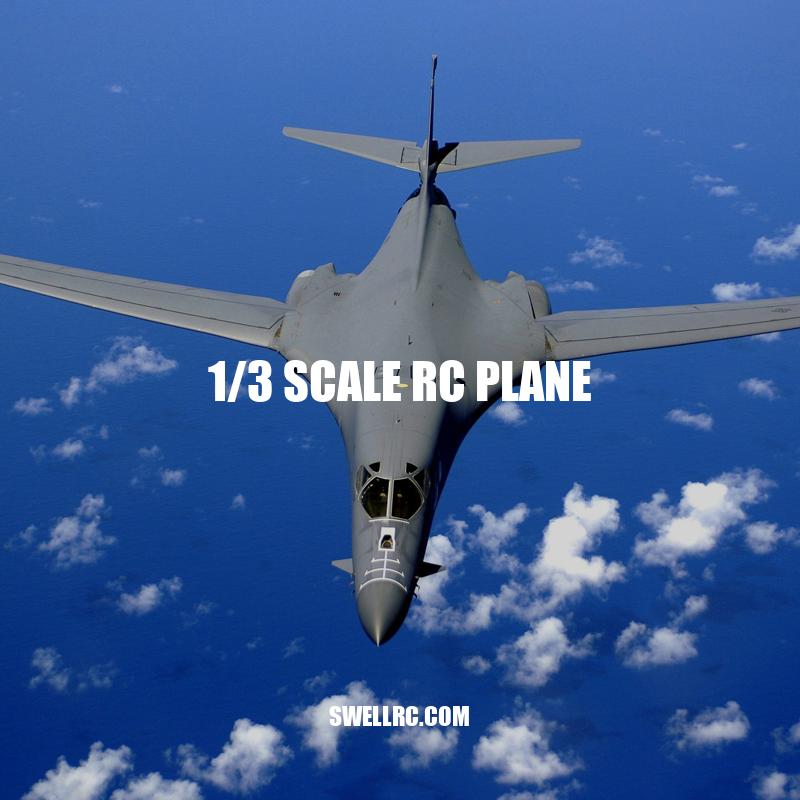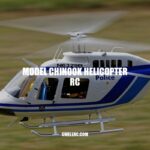1/3 Scale RC Planes: Building, Flying, and Enjoying Your Passion.
Remote control (RC) planes are an exciting and challenging hobby that has attracted enthusiasts for generations. From small foam gliders to large-scale models, there’s an RC plane for every skill level and interest. However, for those seeking a unique and impressive challenge, 1/3 scale RC planes offer an experience unlike any other. These models are exact replicas of full-scale aircraft, built with an uncompromising attention to detail that makes them truly remarkable. From the intricate gauges and rivets to the fully functioning landing gear and flaps, everything on a 1/3 scale RC plane is designed to mimic the real thing. However, building and operating a 1/3 scale RC plane is no small feat. A successful model requires extensive knowledge, skill, and experience. But for those who are up for the challenge, the payoff is well worth it in terms of the satisfaction of accomplishment and the excitement of flying such an impressive model aircraft. In this article, we’ll explore the world of 1/3 scale RC planes, including what they are, their benefits, how to build and fly them, and why they make such a unique and engaging hobby for advanced RC enthusiasts.
Benefits of 1/3 Scale RC Planes
There are many benefits to building, owning, and flying a 1/3 scale RC plane. Here are a few reasons why this type of model aircraft is worth considering:
- Realism: 1/3 scale RC planes are incredibly realistic and are designed to look and operate like their full-scale counterparts. They offer an unparalleled level of detail, from the working gauges and controls to the intricate engine components and moving parts.
- Size: 1/3 scale RC planes are larger than most other model airplanes, making them more impressive and visually appealing. Their size also makes them easier to see and maneuver in the air, particularly for experienced pilots.
- Challenge: Building and operating a 1/3 scale RC plane is a substantial challenge that requires skill, knowledge, and experience. Hobbyists who enjoy a challenge will find that working on these planes can be truly rewarding and a worthwhile use of their time.
- Prestige: 1/3 scale RC planes are often seen as a “pinnacle” of RC aircraft modeling. They aren’t easy to build or operate successfully, and pilots who can do so are often highly respected and admired in the RC community.
If you’re interested in building a 1/3 scale RC plane, there are many resources available to help you get started. Websites like Scale Aircraft Modelling and Flying Giants offer forums and resources for hobbyists interested in building and operating these impressive model aircraft. You can also purchase kits and plans from manufacturers like Wendell Hostetler and Vailly Aviation, who specialize in producing high-quality 1/3 scale RC planes. With patience, practice, and a love for the hobby, building and flying a 1/3 scale RC plane can be a tremendously rewarding experience.
‘What resources are available for hobbyists interested in building and operating 1/3 scale RC planes’?
If you’re a hobbyist interested in building and operating 1/3 scale RC planes, there are several great resources available to you.
One valuable resource is the Academy of Model Aeronautics (AMA), which is a membership organization for individuals and clubs involved in model aviation. The AMA supports a wide range of model aircraft activities, including building and flying 1/3 scale RC planes.
Another helpful resource is the International Miniature Aircraft Association (IMAA), which is dedicated to promoting and advancing the hobby of building and flying large-scale model aircraft. The IMAA offers a variety of resources for hobbyists, including a member directory and access to events and contests.
Online forums and communities can also be a great resource for hobbyists interested in 1/3 scale RC planes. Sites like RCGroups, RC Universe, and Flying Giants offer discussion forums where hobbyists can connect, share tips and advice, and ask questions about building and operating model aircraft.
Finally, there are a variety of books and videos available that can provide valuable guidance and assistance for hobbyists building and flying 1/3 scale RC planes. Whether you’re looking for step-by-step instructions on building a specific model, or general tips and techniques for flying RC planes, there are plenty of resources available to help you pursue your hobby to the fullest.
Building a 1/3 scale RC plane is a complex and time-consuming process that requires precision and careful attention to detail. Here are a few steps involved in building a 1/3 scale RC plane:
- Research: Before you begin building, research the type of plane you want to build. Gather information on its size, weight, center of gravity, and other vital components. This research will help you make informed decisions when selecting materials and construction techniques.
- Plan: Create a detailed plan that includes all of the necessary components and materials. Make sure to account for every detail, from the landing gear to the engines.
- Gather materials: Purchase or gather all of the necessary materials, such as balsa wood, glue, and paints. Make sure to choose quality materials that will withstand the stresses of flight and ensure the longevity of your model aircraft.
- Construct the frame: Build the frame of your plane using the techniques outlined in your plan. This may involve cutting and sanding materials, as well as gluing and shaping them to fit precisely.
- Install hardware and engines: Once the frame is complete, install the hardware, engines, and any other electrical components necessary for operation.
- Cover and paint: Cover the frame with a lightweight material like Monokote and paint it to match the real aircraft’s color scheme.
- Detailing: Add details like decals, windows, and seat cushions to complete the look of the model airplane.
Fun fact: The 1/3 scale RC Fokker D.VIII was featured in the 1997 movie “The English Patient” and flown by actor Willem Dafoe.
One essential resource for building a 1/3 scale RC plane is the online community of model aircraft enthusiasts. Websites like RC Groups offer forums that provide comprehensive information, advice, and support for everything related to building and flying your model airplane. Additionally, manufacturers like Fokke RC and Jack Stafford offer top-quality kits, plans and building instructions for 1/3 scale RC planes.
| Resource | Description |
|---|---|
| RC Groups | An online community resource for model builders and flyers. Its forums offer advice, support and information on building 1/3 scale RC planes. |
| Fokke RC | A manufacturer of high-quality 1/3 scale RC plane kits, including the Fokker D.VIII. Their kits come with detailed building instructions and construction materials. |
| Jack Stafford | Offers plans and kits for 1/3 scale RC planes, like the Pitts Special. They have been in the business for over 40 years, and their kits are known for their high quality and detail. |
What are some recommended online resources for building a 1/3 scale RC plane?
When it comes to building a 1/3 scale RC plane, there are plenty of resources available online to help you. Here are some of the top recommended resources that can guide you through the process and provide helpful information along the way.
1. RCGroups.com: This website is a great place to start if you’re looking for tips, tricks and advice on building RC planes. It has a very active community of RC enthusiasts who are always willing to offer guidance or answer any questions you might have.
2. FliteTest.com: Flite Test is a popular YouTube channel that specializes in RC planes and drones. They have also written articles on 1/3 scale RC planes and provide a wealth of information to help you get started.
3. RCUniverse.com: This website offers a wide variety of resources for RC enthusiasts. It has a forum where you can ask for help and advice from experienced builders and pilots, and you can also find detailed build logs for 1/3 scale RC planes.
4. Amazon.com: Amazon is a great resource for finding everything you need to build your 1/3 scale RC plane. You can find kits, parts, tools, and accessories all in one place.
5. HorizonHobby.com: Horizon Hobby is another great online resource for RC planes. They offer a wide variety of planes, kits, parts, and accessories, and they have a lot of helpful articles and tutorials to help you get started.
There you have it! With these resources, you should be well on your way to building your own 1/3 scale RC plane. Good luck and happy building!
Flying a 1/3 Scale RC Plane
Flying a 1/3 scale RC plane requires experience, skill, and precision. Here are some essential tips to keep in mind when piloting your 1/3 scale RC airplane:
- Find an appropriate flying location: You’ll need plenty of space to maneuver your 1/3 scale RC plane. Choose a location with a large open space so that you have plenty of room to experience the full potential of your plane.
- Pre-flight Check: Inspect your aircraft before each flight to make sure all components are working correctly. Make sure the fuel tank is full, batteries are charged, and the landing gear is in good condition.
- Observe weather and wind conditions: Avoid flying your 1/3 scale RC plane in high winds, rain, or other inclement weather conditions.
- Pilot experience: While 1/3 scale RC planes are exciting to fly, they are not recommended for beginner pilots. You’ll need years of experience flying smaller planes and a thorough understanding of the flying controls and systems.
- Flight pattern: Plan your flight pattern carefully. Takeoff and land into the wind. Practice a few low-flying patterns before attempting full-speed flight.
- Be cautious with throttle: Avoid sudden or jerky movements on the throttle, as it can cause the plane to become unstable.
- Use dual rates: 1/3 scale RC planes are large and have a lot of momentum. Dual rates can help you to slow down and control the movements of your plane.
- Join a club: Joining a club or group of RC plane enthusiasts can provide valuable insight, tips, and resources for piloting your 1/3 scale RC plane.
One recommended resource for flying your 1/3 scale RC plane is the Academy of Model Aeronautics (AMA). They offer valuable safety guidelines, information on events, and resources for hobbyists. In addition, many RC plane clubs offer hands-on training and mentoring programs for new and experienced pilots.
| Resource | Description |
|---|---|
| Academy of Model Aeronautics (AMA) | The AMA provides information, safety guidelines, and resources for RC plane hobbyists. They also organize events and offer a sense of community for RC plane enthusiasts. |
| RC Plane Clubs | Joining an RC plane club can provide hands-on training and mentorship for novice pilots. It also offers a chance to connect with other like-minded hobbyists. |
What are the benefits of joining an RC plane club?
Joining an RC plane club offers a plethora of benefits for enthusiasts of radio-controlled planes. Let’s take a closer look at what these clubs can offer.
1. Community: RC plane clubs are a haven for like-minded people who share the same passion for flying radio-controlled planes. Joining a club provides a sense of community and camaraderie, where you can meet new people, make friends, and share experiences with others who understand and appreciate the hobby.
2. Learning Opportunities: Most RC plane clubs have experienced members who can share valuable knowledge and experience to help you improve your flying skills. You can learn about building and repairing planes, flying techniques, and how to operate your radio-controlled plane safely and effectively.
3. Access to Resources: RC plane clubs are usually well-equipped with facilities to support the hobby, such as runways, pits, and charging stations. Joining a club means that you have access to these resources, which can save you time, money, and effort.
4. Events and Competitions: Many RC plane clubs organize events and competitions that offer a challenging and rewarding experience for members. These events provide opportunities to showcase your flying skills, socialize with other enthusiasts, and win prizes.
5. Safety: RC plane clubs prioritize safety. They provide guidelines to ensure all members enjoy the hobby safely. When you join a club, you will have access to experienced members who can help you understand and apply these safety guidelines.
In conclusion, joining an RC plane club provides numerous benefits. It offers an excellent opportunity to connect with like-minded individuals, learn new skills, access resources, participate in events and competitions, and prioritize safety while enjoying the hobby.
Conclusion
Building and flying a 1/3 scale RC plane is an exhilarating and rewarding hobby. It requires a high degree of skill and experience, but it offers a unique opportunity to construct an exact replica of a full-scale airplane. With a focus on attention to detail and precision, the process of building a 1/3 scale RC plane can be both challenging and immensely satisfying. While piloting a 1/3 scale RC plane requires experience, resources such as the Academy of Model Aeronautics and RC plane clubs offer valuable guidance and support. If you’re looking for a new challenge in remote control plane hobbyism, building and flying a 1/3 scale RC plane could be just the thing for you.



